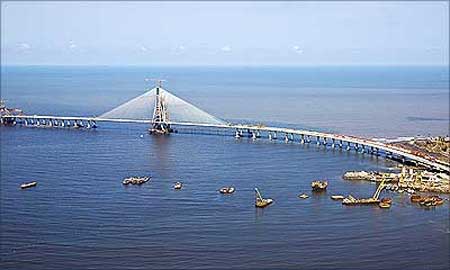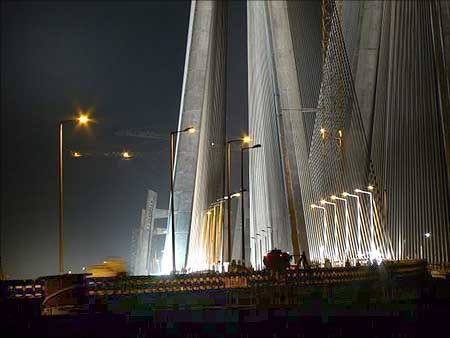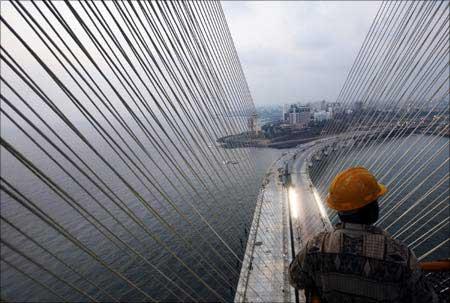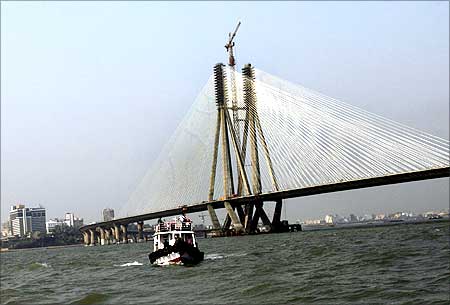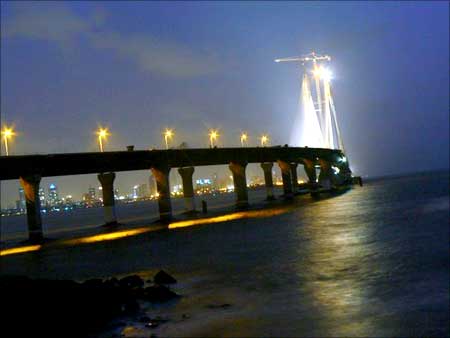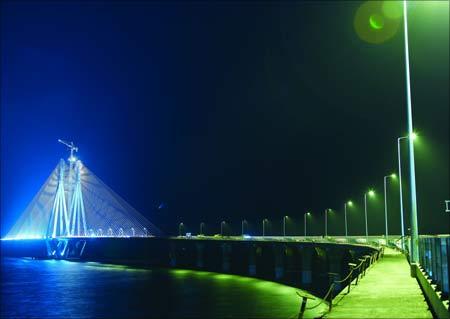 | « Back to article | Print this article |
Fun facts about the Bandra-Worli sea link
The long-awaited Bandra-Worli sea link, seen as an engineering marvel, weighs equivalent to that of 50,000 African elephants!
The steel wire used is equivalent to the circumference of the earth.
The 5.6 kilometre-long cable stayed bridge, to be opened by Congress President Sonia Gandhi on June 30, is 63 times the height of the Qutub Minar. Earlier, the bridge was to be opened to public on June 16.
It has consumed 90,000 tonnes of cement, which would suffice to make five ten-storied buildings, informed a Maharashtra State Roadways Development Corporation official.
Fun facts about the Bandra-Worli sea link
A treat to the eyes, the cost of illuminating the bridge would be Rs 9 crore (Rs 90 million).
The height of the cable-stayed tower is equal to a 43-storey building.
The bridge would provide an additional moving outlet from the island city to the Western suburbs, thereby providing much-needed relief to the congested Mahim Causeway, which records around 1.25 lakh (125,000) public vehicles in a day.
"The eight-lane bridge will reduce the travel time between the two points from 60-90 minutes to 6-8 minutes. This will save around Rs 100 crore (Rs 1 billion) a year in vehicle operating cost alone," the official said.
Fun facts about the Bandra-Worli sea link
The Bandra-Worli sea link project was conceived in the 1990s. But, plagued by a series of public interest litigations from fishermen and environmentalists, the work on the project could not take off till October 2004.
One NGO even took it to the Supreme Court, which dismissed its plea.
Agitations, however, forced MSRDC to make drastic changes, to the tune of 80 per cent, in the design of the bridge.
This, in turn, escalated the cost of the project by around Rs 350 crore (Rs 3.5 billion) from the initial planned outlay of Rs 1,306 crore (Rs 13.06 billion) to Rs 1,650 crore (Rs 16.5 billion).
Fun facts about the Bandra-Worli sea link
Authorities aim to make the bridge a destination in the 'Mumbai Darshan' package.
The Brihanmumbai Electric Supply and Transport, which provides public transport and power in the city, has proposed a ferry trip between Bandra Kurla complex, a city business hub, and the Worli sea face.
The eight-lane bridge will have two lanes dedicated for buses.
Fun facts about the Bandra-Worli sea link
Bajaj Electricals has received the Rs 9-crore (Rs 90 million) illumination contract for the Bandra-Worli sea link project. Needless to say, the lighting will add to the beauty of the bridge.
A toll plaza with 16 lanes and an approximate length of 410 metres is provided at the Bandra end. The toll plaza will be equipped with state-of-the-art toll collection system.
The construction team worked in the project is like a mini-United Nations. Several teams of engineers from China, Egypt, Canada, Switzerland, Britain, Serbia, Singapore, Thailand, Hong Kong, Indonesia and the Philippines have worked on the project.
Fun facts about the Bandra-Worli sea link
Sea link to consume 1,000 KW power a day
The engineering marvel Bandra-Worli sea link, which opens on June 30, is likely to consume 1,000 KW power a day, enough to meet the electricity requirement of 100 households.
"We have installed a transmitter which has 1,000 KVA capacity. This has been placed keeping the demand in mind," Bajaj Electrical's head engineering project Lalit Mehta said.
KVA is a measure of demand load while KWH is a measure of usage. India's per-capita consumption is 750 KWH or 750 units, while the world average is 1,000 KWH per annum. A 40W tube can consume one KWH power in 250 hours.
Bajaj Electricals has got the Rs 9 crore (Rs 90 million) illumination job of the 5.6 kilometer-long bridge, which is going to be a tourist spot in the island city.
Power for illuminating the bridge would be supplied by the Brihanmumbai Electric Supply and Transport and Reliance Power.
The bridge will house diesel generator sets and auto mains failure panels to cater to critical load like, monitoring, surveillance and communication equipment emergency services like aviation obstruction lights.
